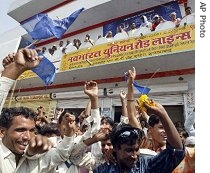-
(单词翻译:双击或拖选)
By Steve Herman
New Delhi
11 May 2007
A political party with socialist1 leanings has regained2 power in India's most politically influential3 state. VOA's Steve Herman reports from New Delhi on a state election that is likely have implications for Indian national politics.
 |
| Bahujan Samaj Party (BSP) supporters dance with news of their candidate leading during counting of votes in Uttar Pradesh state elections in Allahabad, 11 May 2007 |
Supporters of the Bahujan Samaj Party, known as the BSP, celebrated5 their victory Friday as it became clear their party had made huge gains and is returning to power.
BSP leader Mayawati gave credit for the victory to support from beyond the party's traditional base among those at the bottom of India's caste system.
Mayawati says this time, the party enjoyed support across the spectrum6, including upper castes and Muslims.
The results are a significant setback7 for the country's two largest political parties.
The Congress Party - intertwined with the Gandhi family dynasty - traditionally enjoyed deep support in India's most populous8 state. But this time it captured only about 20 of the 402 seats up for grabs, despite high-profile campaigning by party leader Sonia Gandhi and her son and heir apparent, Rahul Gandhi.
A Congress spokeswoman, Jayanti Natarajan, told reporters her party is already looking to the next round of nationwide elections.
"We've not done as well as we would have hoped to do. But 2009 is still ahead of us," said Natarajan. "We will work better, we will work harder and we will always be very important and relevant."
The main national opposition9 group, the Bharatiya Janata Party or BJP, fared better than Congress. But it also lost seats, dashing its hopes that the results in Uttar Pradesh would spark a nationwide revival10.
Both the BJP and Congress were bested by the (Samajwadi) Socialist Party, known as SP, whose core supporters are other lower castes and Muslims.
However, the SP also saw support plunge11, forcing it to relinquish12 control of the state government back to its rival after three and a half years in power.
The political shift in Uttar Pradesh will have ramifications13 for the nationwide political landscape.
The SP is a nominal14 supporter of the Congress-led central government of Prime Minister Manmohan Singh.
Uttar Pradesh, home to 170 million people, has more members of parliament than any other state, and half of the country's prime ministers have come from there.
Mayawati will again become chief minister of Uttar Pradesh - her fourth time heading the state. During a previous stint15 she prompted outrage16 from conservationists when she proposed building a shopping complex and amusement park next to the Taj Mahal. The project was eventually scrapped17.
 收听单词发音
收听单词发音
1
socialist

|
|
| n.社会主义者;adj.社会主义的 | |
参考例句: |
|
|
|
2
regained

|
|
| 复得( regain的过去式和过去分词 ); 赢回; 重回; 复至某地 | |
参考例句: |
|
|
|
3
influential

|
|
| adj.有影响的,有权势的 | |
参考例句: |
|
|
|
4
legislative

|
|
| n.立法机构,立法权;adj.立法的,有立法权的 | |
参考例句: |
|
|
|
5
celebrated

|
|
| adj.有名的,声誉卓著的 | |
参考例句: |
|
|
|
6
spectrum

|
|
| n.谱,光谱,频谱;范围,幅度,系列 | |
参考例句: |
|
|
|
7
setback

|
|
| n.退步,挫折,挫败 | |
参考例句: |
|
|
|
8
populous

|
|
| adj.人口稠密的,人口众多的 | |
参考例句: |
|
|
|
9
opposition

|
|
| n.反对,敌对 | |
参考例句: |
|
|
|
10
revival

|
|
| n.复兴,复苏,(精力、活力等的)重振 | |
参考例句: |
|
|
|
11
plunge

|
|
| v.跳入,(使)投入,(使)陷入;猛冲 | |
参考例句: |
|
|
|
12
relinquish

|
|
| v.放弃,撤回,让与,放手 | |
参考例句: |
|
|
|
13
ramifications

|
|
| n.结果,后果( ramification的名词复数 ) | |
参考例句: |
|
|
|
14
nominal

|
|
| adj.名义上的;(金额、租金)微不足道的 | |
参考例句: |
|
|
|
15
stint

|
|
| v.节省,限制,停止;n.舍不得化,节约,限制;连续不断的一段时间从事某件事 | |
参考例句: |
|
|
|
16
outrage

|
|
| n.暴行,侮辱,愤怒;vt.凌辱,激怒 | |
参考例句: |
|
|
|
17
scrapped

|
|
| 废弃(scrap的过去式与过去分词); 打架 | |
参考例句: |
|
|
|















